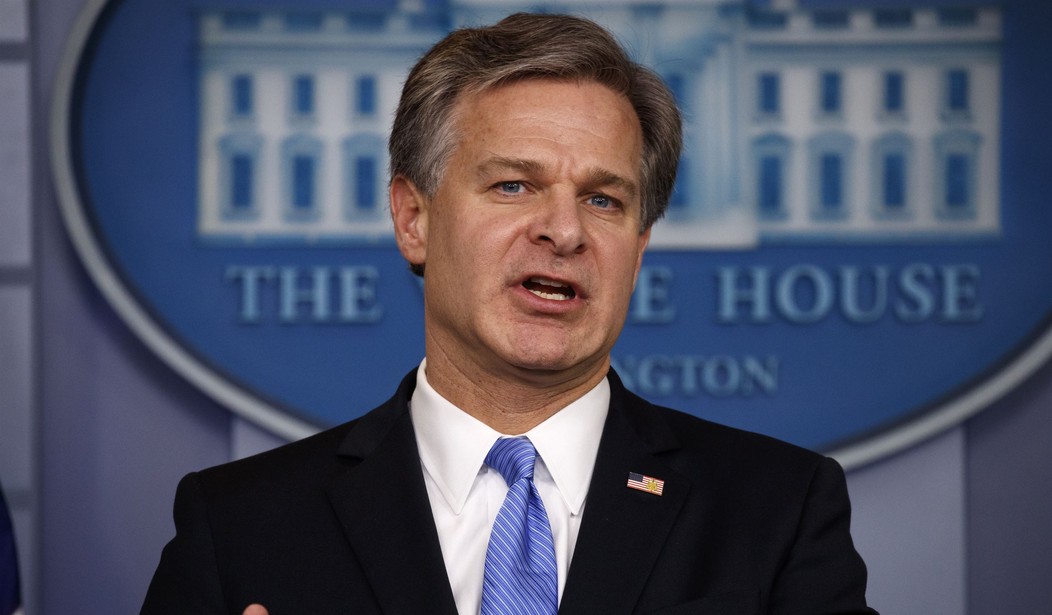FBI Director Chris Wray apologized to the Foreign Intelligence Surveillance Act (FISA) Court for how the agency handled the surveillance of Trump campaign adviser Carter Page during the 2016 election, newly-released court filings reveal.
"The FBI has the utmost respect for this Court, and deeply regrets the errors and omissions identified by the [Office of the Inspector General]. The OIG Report and the affiliated Rule 13(a) letters describe conduct that is unacceptable and unrepresentative of the FBI as an institution," Wray wrote in the court filing. "FISA is an indispensable tool in national security investigations, and in recognition of our duty of candor to the Court and our responsibilities to the American people, the FBI is committed to working with the Court and DOJ to ensure the accuracy and completeness of the FISA process."
Wray has ordered more than 40 correctives actions, 12 of which are specific to the FISA surveillance application process:
The FISA-specific Corrective Actions that I directed the Bureau to undertake are as follows:
- (U) (#1) Supplementing the FISA Request form with new questions, including a checklist of relevant information, which will direct agents to provide additional information and to collect all details relevant to the consideration of a probable cause finding, emphasizing the need to err on the side of disclosure;
- (U) ( #2) Requiring that all information known at the time of the request and bearing on the reliability of a CBS whose information is used to support the FISA application is captured in the FISA Request Form and verified by the CBS handler;
- (U) (#3) Adding reverification directives to th~ FISA Verification Form, known as the Woods Form, which will require agents and their supervisors to attest to their diligence in re-verifying facts from prior factual applications and to confirm that any changes or clarifying facts, to the extent needed, are in the FISA renewal application;
- (U) (#4) Improving the FISA Verification Form by adding a section devoted to CBSs, including a new certification related to the CBS-originated content in the FISA application by the CBS handler, and CBS-related information that requires confirmation by the CBS handler, which will be maintained in the CBS's file;
- (U) (#5) Adding an affirmation to the FISA Verification Form that, to the best of the agent's and supervisor's knowledge, OI has been apprised of all information that might reasonably call into question the accuracy of the information in the application or otherwise raise doubts about the requested probable cause findings or the theory of the case;
- (U) (#6) Adding a checklist to the FISA Verification Form that walks through the new and existing steps for the supervisor who is affirming the case agent's accuracy review prior to his or her signature, affirming the completeness of the accuracy review;
- (U) (#7) Formalizing the role of FBI attorneys in the legal review process for FISA applications, to include identification of the point at which SES-level FBI OGC personnel will be involved, which positions may serve as the supervisory legal reviewer, and establishing the documentation required for the legal review;
- (U) (#8) Creating and teaching a case study based on the OIG Report findings, analyzing all steps of that particular FISA application and its renewals to show FBI personnel the errors, omissions, failures to follow policy, and communication breakdowns, and to instruct where new or revised policies and procedures will apply, so that mistakes of the past are not repeated;
- (U) (#9) Requiring serialization of completed FISA Verification Forms in the FBI's case management system to increase accountability and transparency;
- (U) (#1 0) Developing and requiring new training focused on FISA process rigor and the steps FBI personnel must take, at all levels, to make sure that OI and the FISC are apprised of all information in the FBI's holdings at the time of an application that would be relevant to a determination of probable cause;
- ~U) (#11) Identifying and pursuing short- and long-term technological Improvements, m partnership with DOJ, that will aid in consistency and accountability; and,
- (U) (#12) Directing the FBI's recently expanded Office of integrity and Compliance to work with the FBI's Resource Planning Office to identify and propose audit, review, and compliance mechanisms to ensure the above changes to the FISA process are effective.
Recommended
The revelation comes after Department of Justice Inspector General Michael Horowitz revealed that the FBI made 17 so-called "mistakes" and "errors" during the application process. Not only did FBI lawyers misrepresent key evidence but they also omitted exculpatory information.

























Join the conversation as a VIP Member